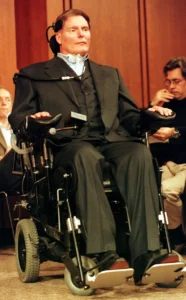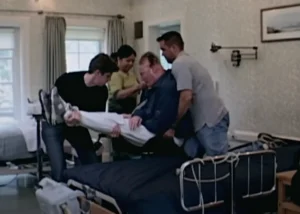Christopher Reeve had a major accident that left him paralyzed.
He felt very hopeless and thought about ending his life.
But everything changed when his wife said some supportive and encouraging words to him.
Christopher Reeve was well-known for playing Clark Kent in the popular “Superman” movies.

His role made him loved by fans all over the world.
Christopher Reeve met his future wife through their shared love for the performing arts. One night, while taking a break, he went to a cabaret show and was captivated by a performer named Dana Morosini.

Winning Dana Morosini’s heart took some effort, but Christopher Reeve eventually succeeded. The couple married in 1992 and welcomed their son, William Reeve, later that same year.
In 1995, Christopher’s life changed dramatically when he was paralyzed from the neck down after a horse-riding accident during a cross-country competition.

In a heartfelt interview in May 2001, six years after his accident, Christopher Reeve talked about how his life had changed. He found it hard to believe that six years had gone by, feeling like the time was both very long and very short.
Christopher shared that he sometimes had flashbacks to the day of the accident, even though he tried not to think about it. He described that day as “very hot, very humid, and very lethargic.”
The Emmy Award winner also remembered feeling that “things weren’t really in the groove” that day. He admitted that he wasn’t fully into the competition and had even thought about going sailing instead.
Over time, Christopher found it easier to accept what had happened. The thoughts about what he could have done differently slowly began to fade.

Although Christopher knew his injuries might feel heavier over time, he decided to keep moving forward and not let those thoughts control his future.
When asked about how the accident affected his family, Christopher explained that while he had faced many injuries before, he always managed to recover without lasting effects.
He admitted that he used to think, “I must not injure myself to avoid becoming incapacitated.” This time, he realized how deeply his injury affected his loved ones.
He felt very guilty and recognized the burden his condition placed on his wife and children. “It’s okay to make your own mess, as long as it doesn’t affect others,” he said. But this injury had clearly impacted those closest to him.

Christopher recalled always trying to avoid serious injuries that could leave him incapacitated. But this time, he understood how deeply his injury affected his loved ones.
He admitted feeling very guilty, recognizing the burden his condition placed on his wife and children. He reflected, “It’s okay to make your own mess, as long as it doesn’t affect others.” Unfortunately, his injuries had a significant impact on those closest to him.